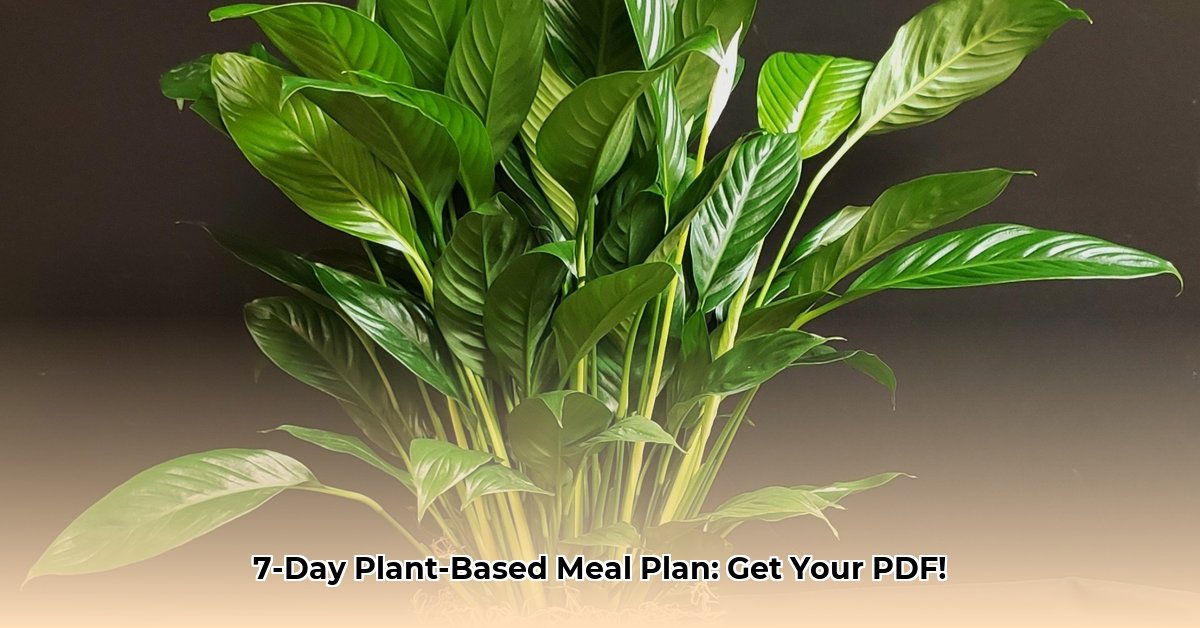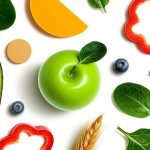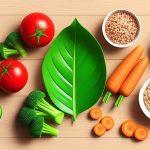Ready to embrace a healthier lifestyle while making a positive impact on the planet? This comprehensive 7-day plant-based meal plan (available as a free PDF download!) is your ultimate guide to delicious, sustainable eating. Whether you’re a seasoned vegan or just curious about plant-based options, this plan offers expert advice, mouthwatering recipes, and practical tips to help you thrive. For a longer challenge, check out this [30-day plan](https://happilylive.com/30-day-plant-based-diet-meal-plan). Get ready to discover how easy and enjoyable it is to nourish your body and protect our environment, one flavorful bite at a time!
Your Passport to Plant-Based Paradise: A 7-Day Meal Plan for a Healthier You and a Healthier Planet
Embark on an exciting culinary journey with our 7-day plant-based meal plan! This isn’t just a diet; it’s an invitation to explore the vibrant world of plant-based cuisine and experience the incredible benefits it offers for your well-being and the environment. Prepare to be amazed by the diversity of flavors, the simplicity of the recipes, and the positive impact you can make with every meal.
This meal plan is designed to be flexible and adaptable. Feel free to swap out ingredients based on your preferences, dietary needs, and what’s available locally. The goal is to inspire you to create a sustainable and enjoyable plant-based lifestyle that works for you. Remember, the most important ingredient is your enthusiasm!
Why Choose Plant-Based Eating?
Beyond the delicious flavors and satisfying textures, plant-based eating offers a wealth of potential benefits. Many people report increased energy levels, improved digestion, and a greater sense of overall well-being. From an environmental perspective, reducing your consumption of animal products is a powerful way to lessen your environmental impact, conserve precious resources, and promote a more sustainable food system. Studies suggest that plant-based diets may contribute to a reduced risk of certain health conditions, although individual results can vary. As always, it’s essential to consult with your healthcare provider before making significant dietary changes.
Our 7-day meal plan focuses on whole, unprocessed plant foods, including a rainbow of colorful vegetables, protein-rich legumes, wholesome grains, and healthy fats. We’ve prioritized simple, easy-to-follow recipes that are perfect for busy weeknights.
Day 1: Lentil Love: A Hearty and Sustainable Start!
Embrace the versatility and nutritional power of lentils with these delicious and satisfying meals.
- Breakfast: Overnight Oats with Berries and Seeds. Combine ½ cup rolled oats, 1 cup plant-based milk, 1 tablespoon chia seeds, and ½ cup mixed berries in a jar or container. Let it sit in the refrigerator overnight. Enjoy cold in the morning.
- Lunch: Hearty Lentil Soup. Sauté diced carrots, celery, and onion with garlic. Add brown lentils, vegetable broth, diced tomatoes, and your favorite herbs and spices. Simmer until lentils are tender. Serve with a side of whole-grain bread.
- Dinner: Black Bean Burgers on Whole Wheat Buns with a Side Salad. Mash black beans with cooked quinoa, corn, diced onion, and spices. Form into patties and bake or pan-fry. Serve on whole-wheat buns with your favorite toppings and a fresh side salad.
Day 2: Green Goodness: Leafy Greens Take Center Stage!
Fuel your body with the vitamins and minerals packed into leafy green vegetables.
- Breakfast: Spinach and Artichoke Frittata. Sauté spinach and artichoke hearts with garlic. Whisk together plant-based eggs with nutritional yeast and seasonings. Pour over the spinach mixture and bake until set.
- Lunch: Kale and Chickpea Salad Sandwich on Whole-Wheat Bread. Massage kale with olive oil and lemon juice. Combine with chickpeas, diced celery, red onion, and a plant-based mayonnaise. Serve on whole-wheat bread.
- Dinner: Tofu and Vegetable Stir-Fry with Brown Rice. Stir-fry cubed tofu with your favorite vegetables (broccoli, bell peppers, carrots, snap peas) in a flavorful sauce (soy sauce, ginger, garlic, sesame oil). Serve over brown rice.
Day 3: Grain Power: Sustained Energy from Wholesome Grains!
Enjoy the sustained energy and fiber provided by these delicious grain-based meals.
- Breakfast: Warm Oatmeal with Nuts and Seeds. Cook oatmeal according to package directions. Top with your favorite nuts (walnuts, almonds, pecans), seeds (chia, flax, hemp), and a drizzle of maple syrup.
- Lunch: Vegetable Curry with Brown Rice. Sauté vegetables (cauliflower, potatoes, peas, spinach) with curry paste and coconut milk. Simmer until vegetables are tender. Serve over brown rice.
- Dinner: Hearty Vegetable Chili with Cornbread. Sauté onion, garlic, and bell pepper. Add diced tomatoes, kidney beans, black beans, corn, and chili seasoning. Simmer until flavors meld. Serve with a slice of homemade or store-bought cornbread.
Day 4: A Culinary World Tour: Exploring Global Plant-Based Flavors!
Expand your culinary horizons with these internationally inspired plant-based dishes.
- Breakfast: Mediterranean Breakfast Bowl. Combine plant-based yogurt with fresh fruit (berries, grapes, melon), a sprinkle of nuts and seeds, and a drizzle of honey or maple syrup.
- Lunch: Mexican Black Bean Salad with Avocado. Combine black beans, corn, diced red onion, bell pepper, cilantro, and avocado. Dress with lime juice and olive oil.
- Dinner: Thai Peanut Noodle Bowl with Tofu. Cook noodles according to package directions. Toss with peanut sauce, cubed tofu, shredded carrots, chopped peanuts, and cilantro.
Day 5: Simple and Satisfying: Quick and Easy Plant-Based Meals!
These meals emphasize speed and ease without sacrificing flavor or nutrition.
- Breakfast: Green Smoothie. Blend spinach, banana, plant-based milk, protein powder and any fruit.
- Lunch: Lentil Salad with Vinaigrette. Combine cooked lentils with diced cucumber, tomatoes, red onion, and parsley. Dress with a lemon vinaigrette.
- Dinner: Pasta Primavera. Sauté seasonal vegetables (asparagus, peas, zucchini, bell peppers) with garlic and olive oil. Toss with cooked pasta and a plant-based cream sauce or vegetable broth.
Day 6: Get Creative in the Kitchen: Experiment with Flavors and Textures!
Unleash your inner chef and experiment with your favorite plant-based ingredients.
- Breakfast: Avocado Toast with Tomato and Sprouts. Toast whole-grain bread and top with mashed avocado, sliced tomato, sprouts, and a sprinkle of salt and pepper.
- Lunch: Potato and Vegetable Soup. Sauté onion, garlic, and celery. Add diced potatoes, carrots, broth, and your favorite herbs and spices. Simmer until potatoes are tender.
- Dinner: Roasted Vegetable and Chickpea Bowl with Couscous. Roast vegetables (broccoli, cauliflower, Brussels sprouts, sweet potatoes) with olive oil and seasonings. Combine with chickpeas and serve over whole-wheat couscous.
Day 7: Reflect and Relax: Celebrate Your Plant-Based Success!
Take this day to relax, enjoy your favorite plant-based meals, and reflect on the positive impact you’ve made on your health and the planet.
- Breakfast: Enjoy your favorite plant based breakfast.
- Lunch: Leftovers from the week.
- Dinner: Homemade pizza with all your favorite plant based ingredients.
Essential Tips for a Successful Plant-Based Journey
- Plan your meals in advance to save time and ensure you have all the necessary ingredients.
- Prep ingredients ahead of time, such as chopping vegetables and cooking grains.
- Stay hydrated by drinking plenty of water throughout the day.
- Listen to your body and adjust portion sizes to meet your individual needs.
- Experiment with new recipes and ingredients to keep things exciting.
- Join a plant-based community for support and inspiration.
Download your FREE 7-day plant-based meal plan PDF today and start your journey towards a healthier, more sustainable future! This is a marathon, not a sprint. Enjoy the process and celebrate every delicious, plant-powered step you take.
Minimizing Water Consumption in Plant-Based Farming: A Comprehensive Guide
Key takeaways
- Plant-based diets generally require less water than diets that rely heavily on animal products.
- The amount of water needed to grow different plant-based foods varies significantly.
- Sustainable farming methods play a crucial role in reducing water usage.
- Consumers, farmers, governments, and food companies must work together to conserve water.
Let’s examine how to reduce water consumption in plant-based agriculture. It is essential for a sustainable food system as the way we produce food has a significant impact on water resources.
Understanding the Water Footprint of Food Production
Producing food, especially animal products, requires a significant amount of water. Raising livestock consumes vast amounts of water for drinking, sanitation, and irrigating feed crops. Plant-based farming generally uses less water than animal agriculture, but it’s not that simple.
Choosing Water-Efficient Plant-Based Foods
The amount of water needed to grow different plant-based foods varies significantly. For example, a bowl of oatmeal needs far less water than a serving of almonds. Tofu and soy milk will also vary in water intensity depending on production methods. It’s important to educate yourself about efficient crop production.
How Can We Improve Efficiency?
- Local Sourcing: Buying locally grown food minimizes
- Why Am I Always Thinking About Food? Your Body and Brain Explain - February 2, 2026
- Healthy Eating Is About Quality, Not Just Calories - February 1, 2026
- Healthy Living Products to Elevate Your Wellness Routine - January 31, 2026










